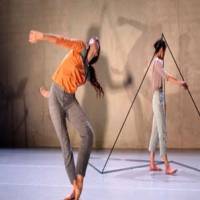CRÍTIQUES

VALORACIÓ
9
Rage against the patriarchal machine…
Publicat el: 17 de març de 2018
CRÍTiCA: Three Times Rebel
“Sexism fixates on the body of a woman,” says the Valencia-born choreographer Marina Mascarell, whose pitch perfect dance piece Three Times Rebel uncovers the roots of the feminist movement as an act of physical defence and then of intellectual defiance. The contemporary work, which premiered last year, developed “organically” after years of research, says Mascarell. In an hour, it explores comprehensively, with dynamism, precision and sub-textual rage, the persistent entrapment and persecution of women in society through degrees of corporeal and psychological violence.
The piece is performed by five dancers, with a punkish on-stage soundtrack provided by Yamila Ríos. They battle with their own bodies or succumb to the crude postures of publicity images imposed on them by the others. They struggle with flimsy yet frustrating structures that unfold and refold to restrict them again, imprisoning them, or pinning them one by one to the back wall. To escape is simply to step out – but that incurs exclusion and isolation. Significantly, the most physically fragile among them is the male dancer “an Orlando figure” says Mascarell, referring to Virginia Woolf’s character who changes from a man to a woman, and whose destiny changes as a result.
The relationship between the physical expression and the literary inspirations for it come through selective quotes from women writers from the past that are given voices by the dancers: Virginia Woolf, Sylvia Plath, Clarice Lispector and Annie Ernaux meet the voice of the patriarchy: an except from a 1950’s Playboy that sounds like 21st century Snapchat, and that infamous “grab them by the pussy” from President Trump. Most palpable as an inspiration, however, is the work of 20th century photographer Francesca Woodman, whose staged images of women disappearing into walls or hanging naked from door frames haunt the piece.
CRÍTIQUES RELACIONADES / Three Times Rebel
TÍTOL CRÍTiCA: Coreografia magnètica
PER: Jordi Bordes

VALORACiÓ
7
TÍTOL CRÍTiCA: Reivindicació sense estridències
PER: Montse Otzet

VALORACiÓ
6
TÍTOL CRÍTiCA: Política de la mirada
PER: Jordi Sora i Domenjó

VALORACiÓ
6

